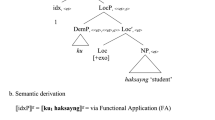Abstract
The standard versions of predicativism are committed to the following two theses: (1) proper names are count nouns in all their (literal) occurrences (the syntactic aspect of predicativism), and (2) names do not refer to objects but express (non-relational) name-bearing properties (the semantic aspect of predicativism). The main motivation for predicativism is to provide a uniform explanation of referential names and predicative names. According to predicativism, predicative names are fundamental and referential names are explained by appealing to a null determiner functioning like “the” or “that.” This paper has two goals. The first is to reject the predicativists’ explanation of the two types of names. I present three syntactic counterexamples to the predicativists’ account of referential names: incorporation, modification, and measure phrase uses. The second goal is to present a novel strategy to explain the two types of names. I propose that referential names are fundamental but that there are null morphemes available for transforming a name into a count noun (and possibly into other syntactic categories).
Similar content being viewed by others
References
Bach, K. (2002). Giorgione was so-called because of his name. Philosophical Perspectives,16, 73–103.
Bach, K. (2015). The predicate view of proper names. Philosophy Compass,10, 772–784.
Baker, M. (1988). Incorporation: A theory of grammatical function changing. Chicago: University of Chicago Press.
Barker, C. (2011). Possessives and relational nouns. In C. Maienborn, K. v. Heusinger, & P. Portner (Eds.) Semantics: An international handbook of natural language meaning (pp. 1109–1130). Berlin: De Gruyter Mouton.
Bartsch, R., & Vennemann, T. (1972). Semantic structures: A study in the relation between semantics and syntax. Frankfurt am Main: Athenaum.
Bauer, L., & Valera, S. (Eds.). (2005). Approaches to conversion/zero-derivation. Münster: Waxmann.
Borik, O., & Gehrke, B. (2015). An introduction to the syntax and semantics of pseudo- incorporation. In O. Borik & B. Gehrke (Eds.), The syntax and semantics of pseudo-incorporation (pp. 1–43). Leiden: Brill.
Burge, T. (1973). Reference and proper names. Journal of Philosophy,70, 425–439.
De Clercq, K. (2008). Proper names used as common nouns in belgian dutch and german. In B. Botma & M. van Koppen (Eds.), Linguistics in the Netherlands (Vol. 25, pp. 63–74). Amsterdam: John Benjamins.
Elbourne, P. (2005). Situations and individuals. Cambridge: MA: MIT Press.
Fara, D. G. (2015a). “Literal” uses of proper names. In A. Bianchi (Ed.), On reference. Oxford: Oxford University Press.
Fara, D. G. (2015b). Names are predicates. The Philosophical Review,124(1), 59–117.
Fara, D. G. (2015c). A problem for predicativism solved by predicativism. Analysis,75(3), 362–371.
Giannakidou, A., & Yoon, S. (2011). The subjective mode of comparison: Metalinguistic comparatives in Greek and Korean. Natural Language and Linguistic Theory,29, 621–655.
Gray, A. (2017). Names in strange places. Linguistics and Philosophy,40(5), 429–472.
Green, J. (2006). An abundance of Katherines. New York: Dutton Books.
Harley, H. (2011). Compounding in distributed morphology. In R. Lieber & P. Stekauer (Eds.), The oxford handbook of compounding. Oxford: Oxford University Press.
Heim, I. (2000). Degree operators and scope. In B. Jackson, & T. Matthews (Eds.), Proceedings of SALT 10 (pp. 40–64). Ithaca: Cornell University.
Heim, I., & Kratzer, A. (1998). Semantics in generative grammar. Oxford: Blackwell.
Hornsby, J. (1976). Proper names: A defense of burge. Philosophical Studies,30, 227–234.
Jeshion, R. (2015a). Names not predicates. In A. Bianchi (Ed.), On reference (pp. 225–250). Oxford: Oxford University Press.
Jeshion, R. (2015b). A rejoinder to Fara’s ‘‘‘literal’’ uses of proper names’. In A. Bianchi (Ed.), On reference (pp. 280–294). Oxford: Oxford University Press.
Jeshion, R. (2015c). Referentialism and predicativism about proper names. Erkenntnis,80(2), 363–404.
Jeshion, R. (2017). ‘The’ problem for the-predicativism. The Philosophical Review,126(2), 219–240.
Kennedy, C. (1999). Projecting the adjective: The syntax and semantics of gradability and comparison. Abingdon: Routledge.
Leckie, G. (2013). The double life of names. Philosophical Studies,165(3), 1139–1160.
Matthews, P. H. (1991). Morphology. Cambridge: Cambridge University Press.
Matushansky, O. (2015). The other Francis Bacon: On non-bare proper names. Erkenntnis,80(2), 335–362.
McCawley, J. D. (1988). The syntactic phenomena of English. Chicago: University of Chicago.
Morzycki, M. (2011). Metalinguistic comparison in an alternative semantics for imprecision. Natural Language Semantics,19, 39–86.
Nunberg, G. (1995). Transfers of meaning. Journal of Semantics,12, 109–132.
Partee, B. H. (1986). Noun phrase interpretation and type-shifting principles. In J. Groenendijk, D. de Jongh, & M. Stokhof (Eds.), Studies in discourse representation theory and the theory of generalized quantifiers (pp. 115–143). Dordrecht: Foris.
Partee, B. (1989). Binding implicit variables in quantified contexts. Proceedings of the Chicago Linguistics Society,25, 342–365.
Schoubye, A. J. (2016). A problem for predicativism not solved by predicativism. Semantics & Pragmatics,9, 1–11.
Schoubye, A. J. (2017). Type-ambiguous names. Mind,126, 715–767.
Schwarzschild, R. (2005). Measure phrases as modifiers of adjectives. Recherches Linguistiques de Vincennes,34, 207–228.
Stalnaker, R. (1974). Pragmatic presuppositions. In M. Munitz & P. Unger (Eds.), Semantics and philosophy (pp. 197–213). New York: New York University Press.
Stalnaker, R. (1978). Assertion. Syntax and Semantics,9, 315–332.
Stanley, J., & Szabo, Z. (2000). On quantifier domain restriction. Mind & Language,15, 219–261.
Wellwood, A. (forthcoming). The meaning of ‘more.’ Oxford University Press.
Acknowledgements
For helpful conversations and comments on this paper, I thank Betul Erbasi, Frank Hong, Robin Jeshion, Elli Neufeld, Jeff Russell, Barry Schein, Scott Soames, Haley Wei, Alexis Wellwood, and the anonymous referees and editors for this journal. I also thank the audiences at the 2018 Pacific APA meeting and at the 4th Philosophy of Language and Mind Conference at Ruhr University Bochum, where I presented earlier versions of this paper, for helpful discussions.
Author information
Authors and Affiliations
Corresponding author
Additional information
Publisher's Note
Springer Nature remains neutral with regard to jurisdictional claims in published maps and institutional affiliations.
Rights and permissions
About this article
Cite this article
Lee, J. On the asymmetry between names and count nouns: syntactic arguments against predicativism. Linguist and Philos 43, 277–301 (2020). https://doi.org/10.1007/s10988-019-09273-8
Published:
Issue Date:
DOI: https://doi.org/10.1007/s10988-019-09273-8



